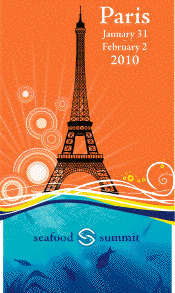 Daniel Pauly recently gave the keynote address at the 2010 Seafood Summit in Paris. His talk compared industrial fishing to a Ponzi scheme, where instead of extracting a sustainable interest from invested capital, we use up the capital itself, and hope for other ‘investors’. He discussed the three-way expansion of fishing through the 20th century: geographically, by fishing in distant waters and getting access to African, Caribbean and Pacific waters; by fishing in deeper and deeper waters; and a taxonomic expansion. Pauly then addressed aquaculture and its limitations, particularly the double accounting of carnivorous farmed fish. He finished by talking about conservation efforts and the need to include the small-scale fisheries in the developing world in conservation efforts. His full talk is available through the Seafood Summit website.
Daniel Pauly recently gave the keynote address at the 2010 Seafood Summit in Paris. His talk compared industrial fishing to a Ponzi scheme, where instead of extracting a sustainable interest from invested capital, we use up the capital itself, and hope for other ‘investors’. He discussed the three-way expansion of fishing through the 20th century: geographically, by fishing in distant waters and getting access to African, Caribbean and Pacific waters; by fishing in deeper and deeper waters; and a taxonomic expansion. Pauly then addressed aquaculture and its limitations, particularly the double accounting of carnivorous farmed fish. He finished by talking about conservation efforts and the need to include the small-scale fisheries in the developing world in conservation efforts. His full talk is available through the Seafood Summit website.
Tag: overfishing
2009 blog posts
High Seas Fleet Kept Afloat with Subsidies
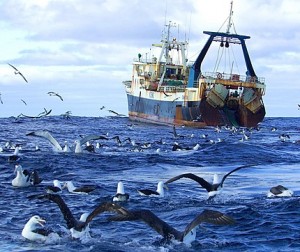 High seas bottom trawlers catch some of the tastiest fish (think Orange roughy, rockfish, and Patagonian toothfish), which are also some of the most vulnerable and overfished species because they grow and mature so slowly. A new study shows that this type of overfishing continues because the 200-strong trawling fleet is kept afloat with government money.
High seas bottom trawlers catch some of the tastiest fish (think Orange roughy, rockfish, and Patagonian toothfish), which are also some of the most vulnerable and overfished species because they grow and mature so slowly. A new study shows that this type of overfishing continues because the 200-strong trawling fleet is kept afloat with government money.
Several members of the Sea Around Us Project led by fisheries economist Rashid Sumaila estimated bottom trawl fleets operating in the high seas, i.e., outside of the Exclusive Economic Zones of maritime countries, receive an estimated US$152 million per year in fisheries subsides, which is 25% of the total landed value of the fish. The profit achieved by this vessel group is normally not more than 10% of landed value, which means that without subsidies, the bulk of the world’s bottom trawl fleet operating in the high seas will be operating at a loss, and unable to fish, thereby reducing the current threat to deep-sea and high seas fish stocks. The study is titled Subsidies to high seas bottom trawl fleets and the sustainability of deep-sea demersal fish stocks and was published online this month in the journal Marine Policy.
Consumer Campaigns, Pig Feed, and Conservation
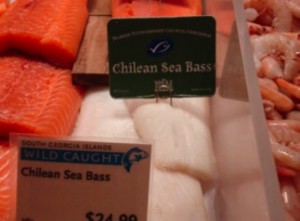 An article titled Conserving wild fish in a sea of market-based efforts appeared last week in Oryx: The International Journal of Conservation authored by Jennifer Jacquet, Daniel Pauly, Rashid Sumaila, and Sherman Lai of the Sea Around Us Project, along with five additional colleagues. Its publication led to an article in the Vancouver Sun on how domestic farm animals are devouring the world’s fish stocks and an AFP piece explaining that consumer campaigns don’t save endangered fish. The article addresses the effects of consumer campaigns in an increasingly globalized market for seafood.
An article titled Conserving wild fish in a sea of market-based efforts appeared last week in Oryx: The International Journal of Conservation authored by Jennifer Jacquet, Daniel Pauly, Rashid Sumaila, and Sherman Lai of the Sea Around Us Project, along with five additional colleagues. Its publication led to an article in the Vancouver Sun on how domestic farm animals are devouring the world’s fish stocks and an AFP piece explaining that consumer campaigns don’t save endangered fish. The article addresses the effects of consumer campaigns in an increasingly globalized market for seafood.
Sumaila Asked to WTO and British House of Commons
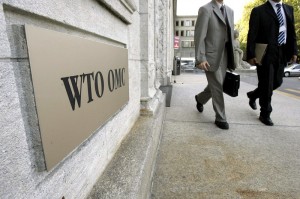 At the end of October, the Sea Around Us Project’s economist and director of the Fisheries Economics Research Unit Rashid Sumaila teamed up with Oceana spokesperson Ted Danson to meet with WTO Director-General Pascal Lamy to discuss the most recent estimates of global fisheries subsidies and the current state of WTO negotiations on this issue. The Economist reported on the fisheries subsidies discussion, particularly fuel subsidies here.
At the end of October, the Sea Around Us Project’s economist and director of the Fisheries Economics Research Unit Rashid Sumaila teamed up with Oceana spokesperson Ted Danson to meet with WTO Director-General Pascal Lamy to discuss the most recent estimates of global fisheries subsidies and the current state of WTO negotiations on this issue. The Economist reported on the fisheries subsidies discussion, particularly fuel subsidies here.
Global fisheries subsidies are estimated to be $25-$30 billion a year and encourage overfishing as well as undermine free market philosophy. The current Doha Round of the WTO is an apt forum for discussing and disciplining harmful subsidies, estimated at $16 billion per year.
From the WTO meetings in Geneva, Switzerland, Sumaila traveled to London to the British House of Commons for another meeting between legislators and scientists. The Marine Advisory Group of GLOBE International, a group that supports political leadership on issues of environmental sustainability, gathered to discuss overfishing.
Sumaila found the legislators involved, a multipartisan group primarily from the UK, to be enthusiastic, particularly the MP from the same region as author/journalist Charles Clover. According to Sumaila, the legislators were very keen on receiving scientific information and data and urged the scientific advisors involved to share their findings candidly.
The Marine Advisory Group will continue to work with Globe International to produce a policy document, which should be completed early 2010, to be taken back to member countries, and presented at a number of UN meetings next year.
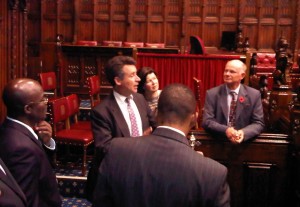 Sumaila, far left, at a meeting of the Marine Advisory Group of GLOBE International in the UK House of Commons.
Sumaila, far left, at a meeting of the Marine Advisory Group of GLOBE International in the UK House of Commons.



